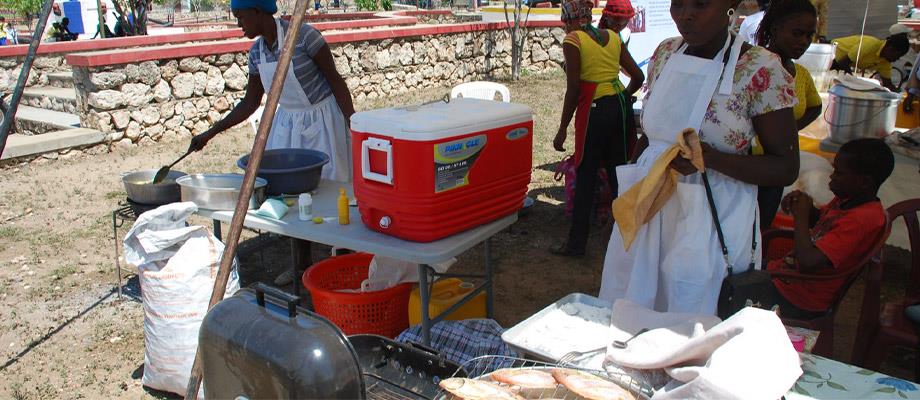Understanding the link between gender and food loss in the fish value chains in Africa

 ©FAO ©FAO |
11 December 2020, Accra – Both gender and food loss issues are well studied, but the link between them has often been overlooked. In Africa’s fisheries value chains in particular, gender relations are a primary factor in the social and economic context that shapes their functioning. They influence labour division, roles, and responsibilities and create disparities and inequalities in access to and control over resources, services, knowledge, and technologies. Gender therefore affects the value chain's overall efficiency and, consequently, food losses. As stated in the Voluntary Guidelines for Securing Sustainable Small-Scale Fisheries in the Context of Food Security and Poverty Eradication (SSF Guidelines), achieving gender equality in the small-scale fisheries requires concerted efforts by all actors, from stakeholders at the grass-root level and small-scale fisheries associations to governmental and intergovernmental institutions and organizations.
With this in mind, experts from the Food and Agriculture Organization (FAO) recently met with representatives from the African Women Fish Processors and Traders Network (AWFISHNET), the African Union Development Agency (AUDA-NEPAD) and WorldFish for a virtual dialogue on further understanding the link between food loss and gender equality in African fisheries value chains, which addressed both Chapters 7 and 8 of the SSF Guidelines.
In his opening remarks, Manuel Barange, Director of the FAO Fisheries Division, said that tackling gender inequality and its relationship with food loss in small-scale African fish value chains is "a development priority. It requires a multi-stakeholder approach, involving small-scale value chain actors, development partners, and all those who can make a difference". He also urged participants and other fisheries stakeholders to adopt a gender lens in analyzing the economic, social, and environmental impacts of the COVID-19 pandemic in fishery and aquaculture value-chains and said, "it is fundamental that such gender lenses become an integral part of ‘the new normal’ imposed by COVID-19".
Empowering women in fisheries and aquaculture
Although one worker in two in fisheries and aquaculture is a woman, women are often invisible in the industry and their work unrecognized and under-estimated. In its paragraph 7.2, the SSF Guidelines stress the need for all parties to recognize the role played by women in the small-scale fisheries sector, placing special attention to their contribution to the post-harvest subsector.
"We need to increase our efforts to make women's and girls' contribution to fisheries and aquaculture much more visible”, FAO Deputy Director-General Maria Helena Semedo said. “It is crucial to work together to remove the gender-based constraints that prevent women from being empowered and thus prevent the fisheries and aquaculture sectors from reaching their full potential."
Lauren Pincus from WorldFish and Suzanne Njeri from AWFISHNET shared their respective organization's experiences in the field.
Suzanne Njeri highlighted the causes of food loss in African fish value chains such as the lack of skills on good handling and hygiene practices; poor access to credit, technology and appropriate facilities; poor infrastructure; and exclusion of women from decision-making. These can be mitigated through capacity development on best practices, technology and entrepreneurship, and creating an enabling environment that promotes gender equality and access to credit, infrastructure and services. She also emphasized the importance of partnership between the government and local and international organizations in capacity building, training and exchange of opportunities.
Lauren Pincus said a recent WorldFish study in Zambia used gender transformative approaches to advance gender equality at the same time as value chain, food security and environmental outcomes. This approach allowed participants to openly engage in understanding gender first, followed by participatory action research to understand what works in communities.
Women’s contribution to food security often overlooked
Bernice McLean from AUDA-NEPAD provided the keynote presentation. She stressed how women’s contribution to food security, livelihoods, household incomes and local economy is significant, but often insufficiently recognized and undervalued. She further provided recommendations for gender and food loss considerations that include enabling policy environments for gender mainstreaming and to enable opportunities for women in intra-regional trade, circular economy approaches and to benefit from technology innovations.
A background paper was also presented highlighting practical guidance and tools for integrating gender concerns into fish loss studies and planning and implementing reduction interventions. The paper interprets key elements of the 2018 FAO Guiding Note on Gender and Food Loss in Sustainable Food Value Chains, adapting it to the African small-scale fisheries context. It also takes into account the concepts developed in the FAO Small-Scale Fisheries Guidelines Gender Handbook and bears in mind the provisions of the eighth chapter of the SSF Guidelines.
Empowering women in fisheries contributes to achieving Sustainable Development 12 – Target 12.3 (halving per capita global food waste and reducing food losses by 2030), and SDG 5 (Gender Equality). It will also accelerate the achievement of the Malabo Strategic Action Area 1, which targets establishing effective post-harvest loss reduction systems in Africa by 2025.
The virtual dialogue sparked fruitful discussions on how gender should continuously be integrated into fish loss assessments, interventions, and strategies. In close collaboration with its partners, the FAO Fisheries Division in Rome and the FAO Regional Office for Africa will continue this initiative and further work to develop capacity on gender and food loss towards achieving sustainable fish value chains in Africa.
